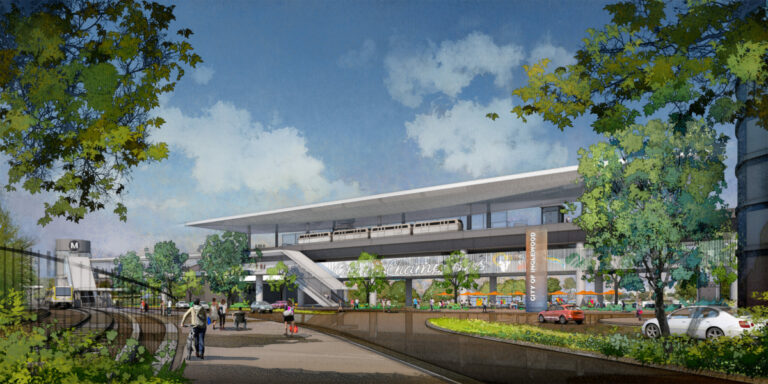
A planned 1.6-mile, $1.5 billion elevated rail line connecting downtown Inglewood with the emerging sports and entertainment center around SoFi Stadium and with the countywide rail network has taken some major steps forward in recent weeks.
On Jan. 31, the California State Transportation Agency awarded the project $407 million as part of its transit and intercity rail program. The agency had previously awarded $93 million in transit funds for the project; last month’s grant brings the state’s total funding to $500 million.
Two weeks earlier, the Los Angeles County Metropolitan Transportation Authority formalized an agreement with the city of Inglewood to form a joint powers authority in charge of constructing the elevated train guideway and three new transit stations.
The joint powers authority will also operate the rail line once it’s built. That’s unlike a similar authority set up to build the Foothill Gold Line rail extension project in the Eastern San Gabriel Valley; when that project is completed, operation of the Gold Line extension will be turned over to Metro.
This brings the long-planned automated rail project closer to reality and it comes amid a development boom. Billionaire Los Angeles Rams owner Stan Kroenke built the $5 billion SoFi Stadium complex and is in the midst of the first phase of residential and retail development on the former Hollywood Park grounds surrounding the stadium. Across the way, another billionaire sports team owner, Steve Ballmer of the Los Angeles Clippers, is building a $2 billion arena to host that basketball franchise.
These follow the renovation of what is now the Kia Forum nearly a decade ago.
And last fall, Metro’s $2.1 billion K Line, formerly known as the Crenshaw-LAX rail line, finally opened, cutting a path through the northern part of the city, about a half-mile north of the central business and civic district.
“Over the past decade we have been able to attract unprecedented economic investment in our city, but it’s success will ultimately be based on whether our residents, employees and patrons have a quality transit option to get to these new amenities,” Inglewood Mayor James Butts said in the city’s announcement of the state funding.
The transit connector project consists of a 1.6-mile elevated guideway running mostly north-to-south, connecting to the K-Line at the Downtown Inglewood station on the north and ending across from SoFi Stadium on the south.
The elevated line will have three new stations: Market Street/Florence Avenue. in downtown Inglewood; Prairie Avenue/Manchester Boulevard near the Forum and Hollywood Park sports/entertainment center; and Prairie Avenue/Hardy Street across from SoFi Stadium/Hollywood Park.
As with most major rail projects, the cost to build the transit connector has increased substantially, from about $1.15 billion three years ago to the current cost estimate of $1.5 billion, thanks in large part to rising materials and construction costs.
Prior to this round of state funding, Inglewood officials had obtained roughly $345 million in funds, including the first round of $95 million from the state transit agency and $234 million in county Measure R sales tax funds.
Construction of the rail line is slated to start sometime next year. That means most of the remaining $750 million will have to be obtained over the next year. Inglewood officials have said they plan to get most of that money from the federal government.
The goal is to have the elevated automated people mover line up and running in time for the 2028 Summer Olympic and Paralympic Games, when SoFi Stadium is slated to co-host with the Los Angeles Memorial Coliseum the Games’ opening and closing ceremonies.
Meanwhile, as the Inglewood Transit Connector emerged as a big winner in this round of state rail transit funding, the Foothill Gold Line Extension project was the most prominent local loser as the project got shut out from state funding.
